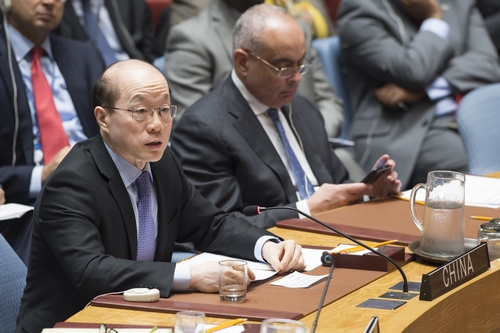| Statement by Ambassador LIU Jieyi at the Security Council Ministerial Debate on Preventive Diplomacy and Transboundary Waters |
| 2017-06-06 05:01 |
|
China commends Bolivia’s initiative to convene this ministerial open briefing on preventive diplomacy and transboundary waters. China welcomes President Morales Ayma as he presides over the meeting. We also thank Secretary-General Guterres for his briefing. Water is essential for human survival and the sustainable development of economies and societies. Transboundary water resources affect the common interests of water basin countries or countries within the lower or upper reach of river basins. Enhanced cooperation on transboundary water resource is conducive to promoting regional security and stability, ecological conservation and sustainable development. I would like to emphasize the following three points. First, it is important to strengthen development and the protection of transboundary water resources, so as to avoid conflicts by utilizing water resources reasonably. Countries in transboundary water basins should bear in mind the importance of safeguarding regional peace and security in the spirit of win-win cooperation through comprehensive means, such as improving disaster prevention and increasing agricultural efficiency. We must take an integrated approach towards soundly developing, reasonably allocating, conserving and efficiently using transboundary water resources, with a view to comprehensively enhancing our ability to ensure water security. We must enable the sharing of water resources in order to promote win-win cooperation. Secondly, enhanced dialogue and consultations among countries in water basins represent effective means of managing transboundary water resources. As parties directly involved in transboundary water issues, countries in the basins should make an effort to build and improve coordination mechanisms. They must step up their communications with respect to transboundary waters, foster mutual trust and deal with disputes in a timely and proper manner. The United Nations and regional organizations should fully respect the wills of the countries concerned. In view of the specific contexts on the ground, they should play a constructive role of promoting cooperation. They should help those countries in the basins defuse tensions and build consensus in order to make transboundary water resources a subject of regional cooperation. Thirdly, we should deepen international cooperation on international water resources and step up capacity-building for developing countries. It is important to strengthen international water resource cooperation arrangements. We must put in place a solid legal framework for transboundary water cooperation. We should further support the United Nations High-level Working Group on Water Resources, the High-level Panel on Water Resources and peace, and other mechanisms in their work, actively provide technical assistance to developing countries and improve water resource management and the sustainable use of water, all with a view to fostering synergy among the international community with respect to water. Great emphasis should be placed on addressing issues of water shortages in Africa. We should support African countries in cooperating on transboundary water resources and help them build water conservancy infrastructure, all in order to bring concrete benefits to African people. The protection of water resources should be incorporated into the framework of peacebuilding in order to ensure water security in post-conflict situations. Along with the rest of the international community, China stands ready to continue promoting the sustainable development and utilization of water resources so that transboundary waters can serve as pillars of cooperation and peace, thereby making even greater contributions to the prosperity and development of humankind. |
| |||||||||||||
| |||||||||||||
